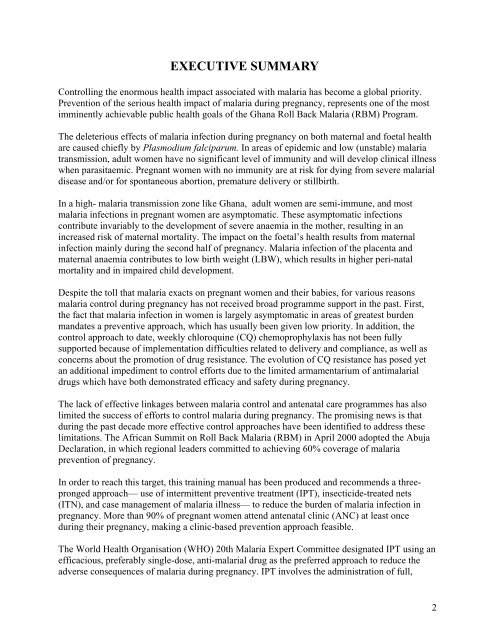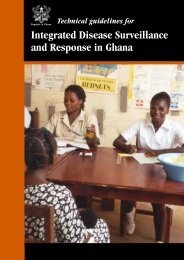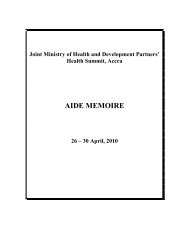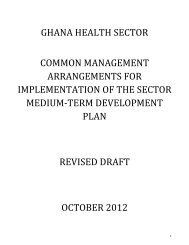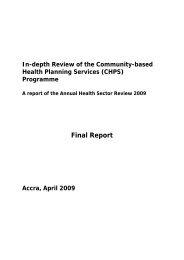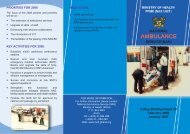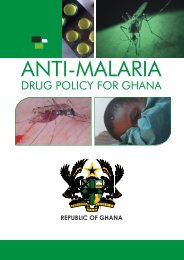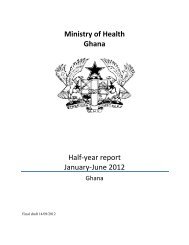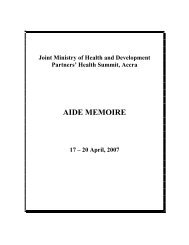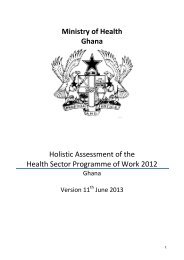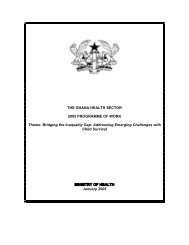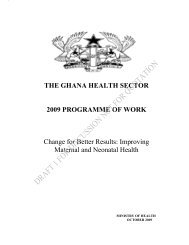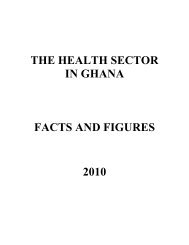Training Manual for Preventive Malaria - Ministry of Health
Training Manual for Preventive Malaria - Ministry of Health
Training Manual for Preventive Malaria - Ministry of Health
Create successful ePaper yourself
Turn your PDF publications into a flip-book with our unique Google optimized e-Paper software.
EXECUTIVE SUMMARY<br />
Controlling the enormous health impact associated with malaria has become a global priority.<br />
Prevention <strong>of</strong> the serious health impact <strong>of</strong> malaria during pregnancy, represents one <strong>of</strong> the most<br />
imminently achievable public health goals <strong>of</strong> the Ghana Roll Back <strong>Malaria</strong> (RBM) Program.<br />
The deleterious effects <strong>of</strong> malaria infection during pregnancy on both maternal and foetal health<br />
are caused chiefly by Plasmodium falciparum. In areas <strong>of</strong> epidemic and low (unstable) malaria<br />
transmission, adult women have no significant level <strong>of</strong> immunity and will develop clinical illness<br />
when parasitaemic. Pregnant women with no immunity are at risk <strong>for</strong> dying from severe malarial<br />
disease and/or <strong>for</strong> spontaneous abortion, premature delivery or stillbirth.<br />
In a high- malaria transmission zone like Ghana, adult women are semi-immune, and most<br />
malaria infections in pregnant women are asymptomatic. These asymptomatic infections<br />
contribute invariably to the development <strong>of</strong> severe anaemia in the mother, resulting in an<br />
increased risk <strong>of</strong> maternal mortality. The impact on the foetal’s health results from maternal<br />
infection mainly during the second half <strong>of</strong> pregnancy. <strong>Malaria</strong> infection <strong>of</strong> the placenta and<br />
maternal anaemia contributes to low birth weight (LBW), which results in higher peri-natal<br />
mortality and in impaired child development.<br />
Despite the toll that malaria exacts on pregnant women and their babies, <strong>for</strong> various reasons<br />
malaria control during pregnancy has not received broad programme support in the past. First,<br />
the fact that malaria infection in women is largely asymptomatic in areas <strong>of</strong> greatest burden<br />
mandates a preventive approach, which has usually been given low priority. In addition, the<br />
control approach to date, weekly chloroquine (CQ) chemoprophylaxis has not been fully<br />
supported because <strong>of</strong> implementation difficulties related to delivery and compliance, as well as<br />
concerns about the promotion <strong>of</strong> drug resistance. The evolution <strong>of</strong> CQ resistance has posed yet<br />
an additional impediment to control ef<strong>for</strong>ts due to the limited armamentarium <strong>of</strong> antimalarial<br />
drugs which have both demonstrated efficacy and safety during pregnancy.<br />
The lack <strong>of</strong> effective linkages between malaria control and antenatal care programmes has also<br />
limited the success <strong>of</strong> ef<strong>for</strong>ts to control malaria during pregnancy. The promising news is that<br />
during the past decade more effective control approaches have been identified to address these<br />
limitations. The African Summit on Roll Back <strong>Malaria</strong> (RBM) in April 2000 adopted the Abuja<br />
Declaration, in which regional leaders committed to achieving 60% coverage <strong>of</strong> malaria<br />
prevention <strong>of</strong> pregnancy.<br />
In order to reach this target, this training manual has been produced and recommends a threepronged<br />
approach— use <strong>of</strong> intermittent preventive treatment (IPT), insecticide-treated nets<br />
(ITN), and case management <strong>of</strong> malaria illness— to reduce the burden <strong>of</strong> malaria infection in<br />
pregnancy. More than 90% <strong>of</strong> pregnant women attend antenatal clinic (ANC) at least once<br />
during their pregnancy, making a clinic-based prevention approach feasible.<br />
The World <strong>Health</strong> Organisation (WHO) 20th <strong>Malaria</strong> Expert Committee designated IPT using an<br />
efficacious, preferably single-dose, anti-malarial drug as the preferred approach to reduce the<br />
adverse consequences <strong>of</strong> malaria during pregnancy. IPT involves the administration <strong>of</strong> full,<br />
2


